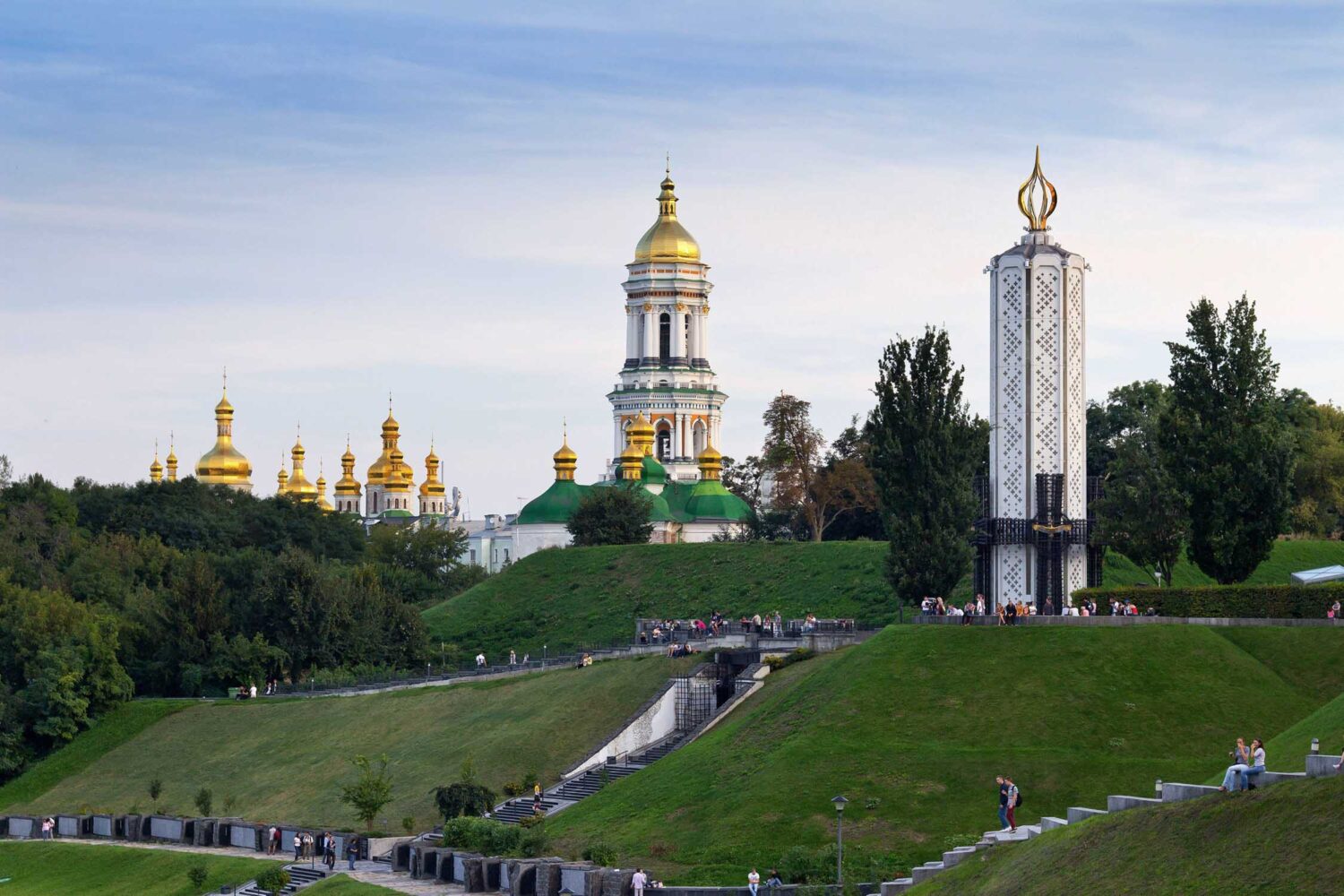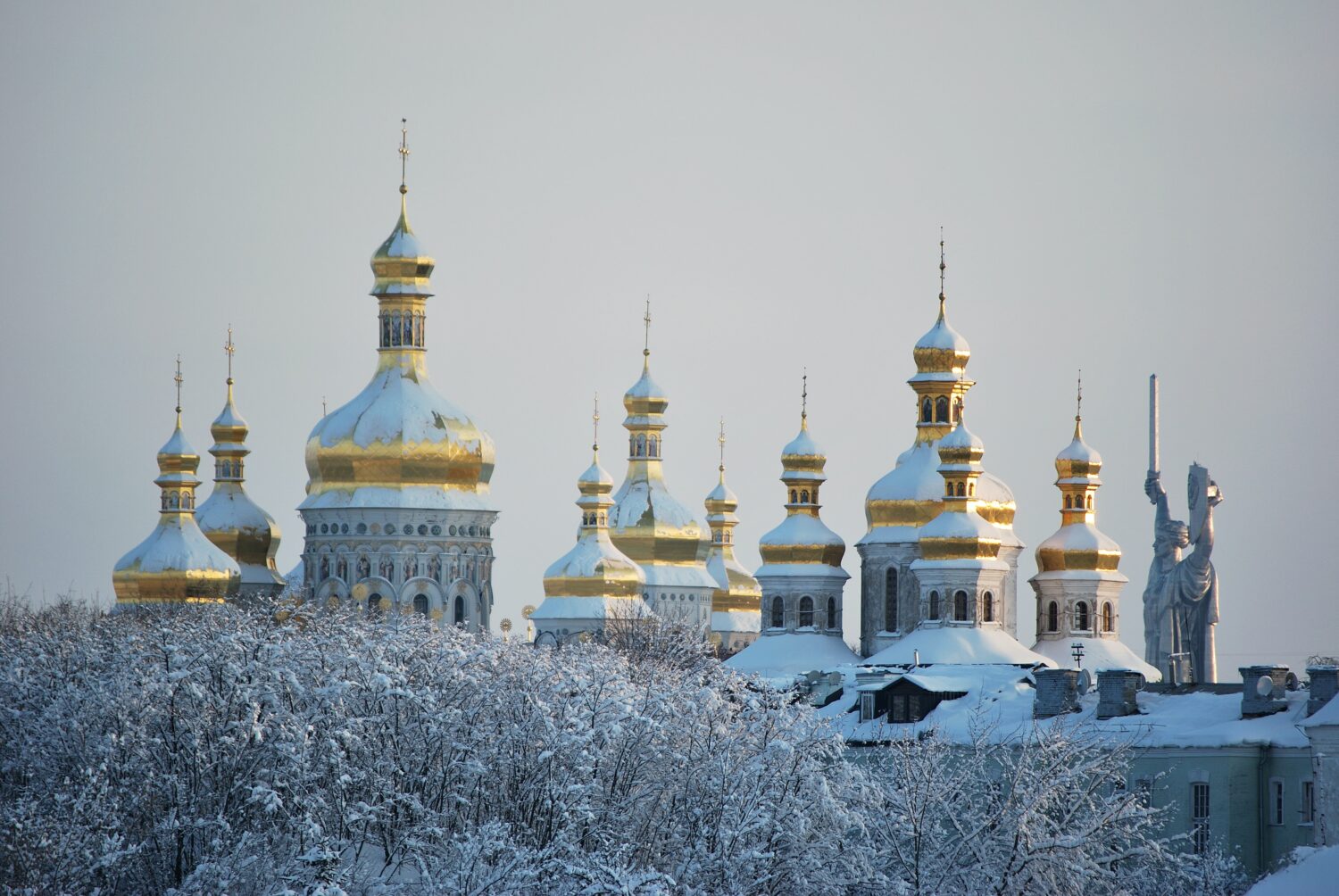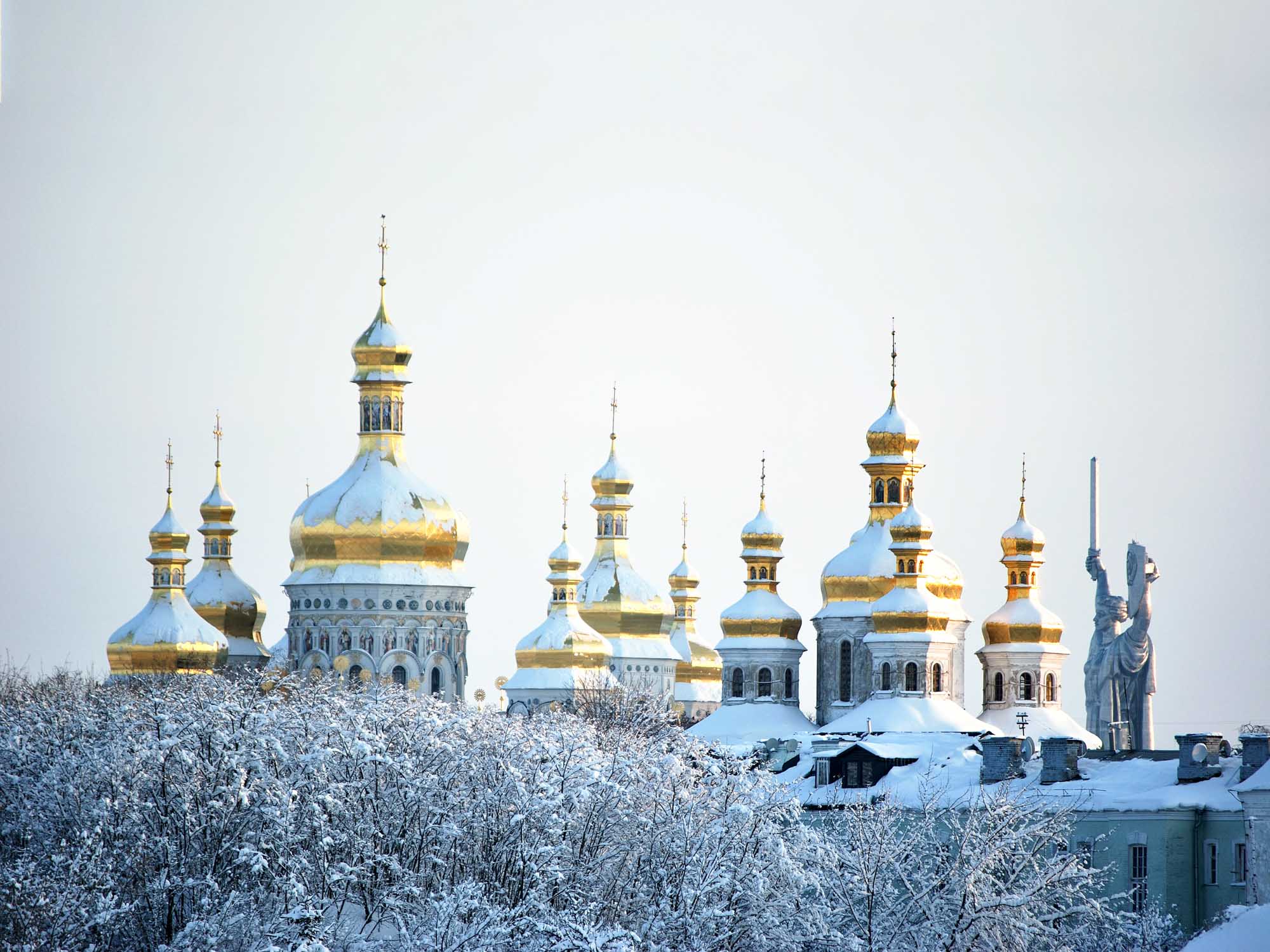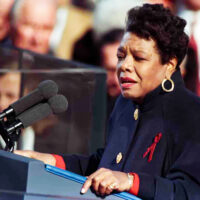The crisis in Ukraine continues to escalate. What role does Europe play? Not getting caught between the camps of East and West is an opportunity for Europe. This would require a new understanding of fears and similarities, of self-determination and trust in each other. This requires the right political ideas and decisiveness. Louis Defèche spoke to Gerald Häfner about this.
How do you see the situation in and with Ukraine?
The situation is dramatic. These are dangerous developments taking place there. More than 100,000 soldiers have been amassed on the border between Russia and Ukraine. East and West outbid each other with demands and threats. The tone becomes more intolerant and violent. I am appalled by how carelessly the media in the middle of Europe today talk about war again, and how negligently war is even brought about. I think this is a throwback to a time that I thought had been overcome.
The problem has existed there for a few decades. How did it emerge?
The problem goes back a long time. If we only look at the last few decades, we have to remember that there was a period of about 45 years after the Second World War, in which Europe was divided by a wall and barbed wire and both sides were staring at each other. It was the time of the Cold War, the ‹block logic›. That was to change in 1989. It was not the military, the secret services, or the governments, but the citizens, who have overcome this logic. This movement began in Eastern Germany, with candles and with songs in the streets. There were parallel, sometimes even earlier movements in the Baltics, Armenia, Georgia, Poland, Ukraine, and other countries to free themselves from this logic. It was a movement for self-determination, freedom, democracy, cooperation, and collaboration in Europe. The Wall fell and Germany was reunited.
At that time I worked in the Bundestag. At first, there were formal talks only at the level of the governments, i.e. with the instruments of foreign policy. But I saw the events as a question of future domestic policy and thus of democracy, of Parliament. After all, it was about shaping our common future. At my suggestion, the Bundestag then set up a Special Committee on German Unity, which accompanied all the deliberations. Together with three other colleagues, I then became the German Bundestag’s rapporteur for unity, so I was given the task of closely monitoring the negotiations, reporting to the Bundestag, and developing proposals for the path to the future unity of Germany on behalf of Parliament. A crucial question was whether the Soviet Union – represented by Mikhail Gorbachev – would give its consent to the unity of Germany, so that what had previously been the staging area of the East, i.e. the GDR, would in the future become part of the Federal Republic of Germany. The approval was given on the condition that NATO, i.e. the Western military alliance, does not advance further east. This was discussed at the time, but not put down in writing. Participants from both sides have confirmed this.
But this promise has been broken. NATO has gradually advanced further eastwards. Poland, the Czech Republic, and Hungary joined in 1999, during the first eastward expansion, Bulgaria, Estonia, Latvia, Lithuania, Romania, Slovenia, and Slovakia in 2004, Albania and Croatia in 2009, Montenegro in 2017, and North Macedonia in 2020. The admission procedure is underway for Bosnia, Herzegovina, Kosovo, and Serbia, Georgia and Ukraine want to be admitted. In addition, there are troop deployments and increasingly aggressive military maneuvers – from both sides, by the way. In Ukraine, there were strong efforts in 2013/14 and there are currently strong efforts to align oneself towards Europe and NATO. For the West, all this only confirms the cultural, political, economic, and military superiority of its own system. Russia, however, feels increasingly oppressed and constricted. From the point of view of the Russian leadership, Ukraine belongs to its own sphere of influence. In this, it does not want to tolerate NATO.
In addition, Ukraine is a quasi-divided country. The areas in the east around Donetsk and Luhansk are predominantly inhabited by Russian-speaking populations. Tensions there have increased, and Russia argues: «We must protect our Russian population in Ukraine. We are their security guarantee.» The West warns of an invasion and threatens with the most violent countermeasures. This escalates from day to day.
In our newspapers, however, you can read a different story from what I have described above. I deliberately told it this way, because most of the time we only read about Putin’s incessant provocations, which demand a tough and united reaction from the West. It’s different in alternative and left-wing media. They share Putin’s positions in a mostly deluded manner and therefore see all blame and aggression in the West. That’s no better. Such partisanship is only the reflection of those against whom one supposedly defends oneself. But it must also be said that Putin’s Russia is aggressive, nationalistic, totalitarian. There is hardly any freedom. Genuine opposition is banned, suppressed, imprisoned in camps, and often even murdered.
So it is legitimate to say: Let people choose for themselves, decide for themselves. And let’s see if there is another option: not either the decision for the West, for the USA and NATO, or for the East, for Putin’s Greater Russia, but for a third option that stands in between (or better: above it): for Europe. A free, self-determined, neutral Europe. Then it would no longer be about the old reflexes! It would no longer be about taking one side or the other, but finally about overcoming both, building bridges. To fill in the trenches. To bring Europe together.
As legitimate as Russia’s desire to respect its ‹zone of influence› may seem at first glance, the idea of restricting the free decision on the political course of independent countries (and thus the decisions of their populations, their sovereigns) or determining them by ‹block membership› is ludicrous and unacceptable in today’s world. But if the free choice was not synonymous with the change of side, the block affiliation, but leads to a mutual independence on both sides, then it would be feasible without massive fear and threat.
We must therefore begin to think of Europe – and also this conflict – beyond the logic of the block.

Are there two trains of thought present in Ukraine at the same time? On one hand, feeling connected to Russian and at the same time the desire for more democracy, freedom, and more connection with Europe?
Yes, there are both. And both are legitimate. It is wrong to assign people to camps and to present things as incompatible. Wrong is a policy that says that a country can only belong to either the West or the East. This is an absurd, antagonistic point of view. That time is actually over. I want Europe as a whole to understand that it is not the West and not the East, but an area in between in which we must develop our own forms of cooperation, collaboration, and mutual protection. This is also the case in Ukraine. It is tragic that the Western-oriented part of Europe is arguing so escalatingly at the moment and allowing itself to be ‹pulled in front of the carts of the West›. On the other hand, Russian great power ambitions and the increasingly nationalist, militaristic tone of politics there are equally as tragic. On the other hand, it would be appropriate to look for solutions together with the people there, solutions beyond war, solutions beyond this false alternative East or West, NATO or Russia.
In recent years, Europe has done little to get involved. Russia is talking directly to the US. It is as if Europe was not there. How did this come about?
There have been attempts by the European side to introduce a different logic into the situation. They still exist, but they are weak, anxious, indecisive. There was the Minsk agreement with the aim of de-escalating and pacifying the war that broke out in Eastern Ukraine in 2014. And there is the so-called Normandy format, in which Russia, Germany, France, and Ukraine negotiate together on the Ukraine conflict. But all this is a rather weak, hesitant flanking of the increasingly aggressive policies that can currently be observed from West and East. Tiny steps. Timid. Europe does not dare to put its own proposal on the table. I deliberately speak so radically, because finally, someone has to break through this primitive logic! At the moment it’s like kindergarten. Every side says: «You started!» – «No! You started!» And: «I am stronger than you! If you keep going, I’ll beat you!» – «No, I’m stronger. If you keep going, I’ll beat you much worse!» We should have overcome this mutual escalation long ago – individually, humanly, and between states. We should ask: What hurt you? What scares you? What could I do to make you feel safer – and vice versa?
Actually, in 1989/90 we had the chance of a lifetime. But we missed it. At that time, it would have been a European opportunity and task to form a non-aligned area of common security in this Central and Eastern Central European area, which for so long had been the bridgehead of external forces in East and West. Let us develop new forms of cooperation with a mutual guarantee of security in Central Europe and in Europe as a whole – that was my suggestion at the time! We have even formulated a new constitution for Germany, as a draft. After all, the German Constitution required that a new constitution should take its place as soon as Germany was reunited. That is why the preamble to the Constitution stated: «for a transitional period». Because in 1949 it was clear: «Only the people can give themselves a constitution. But since the division of Germany prevents a part of the people from participating in it, we cannot yet make a constitution, but only a provisional one.» The final provision of the Constitution read accordingly: «This Constitution loses its validity on the day on which a new Constitution was adopted by the German people in free decision.» With reference to this, I founded an initiative at the time for a constitutional process from the bottom. There was then a joint constitutional commission of the federal and state governments, to which I was able to present this proposal. It was voted for by a majority in favor of this path! But the German government was firmly opposed to it. So we actually had a majority for this constitutional process, but in the end, we did not have the necessary majority to change the constitution. Thus, despite all the good arguments, the proposal failed.
Here, however, the idea from this process is important. We had reformulated the article that allows Germany to join the Alliance. And in such a way that there was only the possibility of joining an alliance in which states that seek protection from each other are members. This means that Germany should leave the logic of the block. It should not deepen the division, but help overcome it. The constitutional mandate is: We are creating an area of mutual security in Europe. A common alliance of Eastern, Central, and Western (Europe). What gives countries the best possible protection? Not the build-up, but only the reduction of military threat potentials. So we can reduce the threat potential in Europe – and develop as a common (block-free) area of peace, freedom, and cooperation? That was the idea, and that would still be possible. The European voice in the negotiations on Ukraine could be one that does not strengthen either NATO or Russia, as many actors are currently doing on one side or the other, but that asks: How can we overcome this wrong logic? In my opinion, there are certainly proposals.
What could this mean for Europe?
At present, there is a double reflex in the EU: first, the far-reaching equation of Europe and NATO – and then the idea that Europe can play a role in the competition of the great powers by building a common army – on an equal footing with the USA, Russia, and China, so to speak. It is thought that only when we have as much of our own military and weapons as possible will we finally play a real role. But this is nonsense. Militarily, we will never be able to catch up to the superpowers. But this race is an anachronism that is increasingly leading to a dead end. In the future, the world will need much more of an actor with sufficient strength, influence, ideas, economic and political strength who can support the break-up and changes of this crude, atavistic logic of the 20th century. The 21st century needs different ways of dealing with things. Cooperation, contracts, talks, relationships, and trust play a much more important role here.
With such a newly defined policy, Europe would really emerge as a continent with its very own identity and power.
Some things had already begun quite tenderly. For example, there was the START agreement, the IMF agreement, a number of agreements that limited the number of strategic nuclear warheads, medium- and long-range weapons in Europe. But they were terminated without having a new agreement! So the first thing would be to start these negotiations again and limit the weapons. Further steps would be to reduce the military and then tensions as well, to hold constructive conflict resolution talks, to exchange observers, to open up to each other politically and economically, and to network. Above this is the point of view of ending this absurd idea of saying that people can only belong either here or there.

Take Ukraine. It is a country with different population groups. There are many Ukrainians, many Russians, and many Tatars – to name only the largest population groups. Their culture, traditions, and often also interests are different. This also leads to different orientations in the current conflicts. As long as you think that Ukraine can only belong either here or there, either one way or the other, one group will always feel oppressed. Therefore, there must of course also be autonomy in the various regions. There must be self-determination, for example for Donetsk, for Luhansk, for Mariupol, for Crimea, and so on. A lot would be gained by that. But all this is only possible if we stop these threat scenarios, dismantle the weapons, overcome the block logic, and guarantee each other security. This is possible if East and West would assure each other when concluding a contract that they would no longer attack each other. Then you could dismantle most of the weapons.
What could this European policy look like if we overcome the logic of the block?
That’s a good question because it’s never asked in politics. We have to start really designing the future, rethinking. The future that I would like to see for Europe is that of dismantling precisely this logic of the blocks, of these military potentials, and of dismantling them increasingly at borders. We can and must also gradually overcome the idea of a national unitary state, if only because the population is in fewer and fewer countries uniform. This would mean that we should start more and more to no longer think in insurmountable, conclusive boundaries but rather to understand them as membranes. We could develop overlapping structures. Overlapping in the sense of a functional structure that does not have to coincide with regional and national (political) borders. This idea, if taken seriously, goes far beyond the question of security or the military question.
Let’s take Waldorf schools as an example. They must meet the applicable government requirements in every country in the world. Everywhere the rules are different. And every Waldorf school makes compromises because it has to follow them. What is tested and documented at the end plays a major role. But you often learn things that do not make sense from the point of view of Waldorf education. School graduation certificates are determined by national law – and, conversely, determine the contents of the school curriculum. But what if the Waldorf schools agreed among themselves what should apply to them? They could do that much better. One could also imagine this across borders. Then you could say: I live in Luhansk or I live in Kyiv and I send my children to the Waldorf school. The rules for this Waldorf school are not made by the Ukrainian state, not even by the Russian or the USA, but by the people who connect with this education and who are competent in it.
You can also make this example for other areas, also economically. Who I work with economically is not dictated by the boundaries of a state or a political alliance system. Unfortunately, people are currently still thinking in closed units. We have to break this down and we have to arrive more and more at self-determination and self-government in these areas.
Many people today want to strengthen the nation-state. In supranational, technocratic structures, they are experiencing a loss of democracy, for example in the European Union. What would you answer?
These people are right in their analysis, but not in the consequences they draw from it. The technocratic danger – the tragedy of today’s world – also comes from the fact that the law has so far been and still is national. The law finds its limit at the border of the nation-state, and that cannot solve many problems. This starts with human rights, continues with ecological problems, climate problems, for example, the overfishing of the oceans. We cannot regulate this with a German or French law alone. We need a law that has an impact beyond the national level. So we must also develop law above the nation-states. If you don’t have a new idea of how to do this methodically, then it inevitably boils down to technocracy and centralism, and in the end perhaps even to a world government that tells us how to eat or whether we have to vaccinate ourselves. This is highly dangerous, but not the idea that there must be a development of the law in every area. This idea is correct.
We need more things in Europe that we can regulate together. At the same time, however, we need structural protection against the fact that more and more law slides into Europe like the snow on the roof in spring as if on a sloping level. Because the supra-regional law always breaks the regional law. As a result, more and more competencies are ending up at levels that are further away from the people.
We must break through this logic and see that we are strengthening the law among the people, i.e. decentralizing it, strengthening subsidiarity. Wherever we create justice, there must be social self-determination. In the age of democracy – or anthroposophically I would say: in the age of the consciousness soul – the law is no longer something that a person or an authority can prescribe to others. As citizens, as human beings, we all have the same value. At the level of the law, we are all the same. Rudolf Steiner said that today only that in which everyone had the opportunity to participate can be regarded as a right. It must be about how we strengthen the direct participation of people at all levels through citizen participation, through deliberation, participation, direct democracy, i.e. voting. The tragedy today is also that the little people have to abide by the law of their country, as it is given in their country because they have no other options. But those who have a lot of money, including large multinational corporations, choose the law they like or do not adhere to any law at all, for example, pay no taxes at all because they can escape it. The solution to this is not to close one’s eyes, but to ask oneself substantially which right belongs at which level. What do we have to regulate and where? And then shape all levels in the sense of self-government and democracy.
How can we expand this image for Europe between West and East?
First of all, I would say that the people in Europe have long been there for the most part in their soul and longing. It is an idea that has long been alive in people’s minds and hearts, but which is not realized politically. Unless you are in such a dramatically aggravated situation as we are currently in Ukraine. You will hear many other opinions, but even that is ultimately marginal to the people who say: Stop this madness, we have to find ways to work together and understand each other. There is a lack of political concepts, of ideas in general. An important idea in my opinion is that one says goodbye to this idea that the state is the superior of its citizens and the sole determinant and legislator. We have to understand that as human beings we are connected on completely different levels. One of them is this legal-political one, another is an intellectual-cultural one, another is the economic one. In all these layers there are different types of conditions in the state.
Is it about the shaping of law in the economic sphere? Then it’s about shaping love, cooperation, working for each other. When I do business, I always act for others. It is interesting that there are many economic relations between Germany and Russia. When you talk to people, you realize that it’s not just driven by profit expectations. It has a strong human, emotional component. Those who work together, trust each other and are fascinated by the quality of the other side. Russia is strongly oriented towards Europe. But the Germans who work in Russia always talk about how they experience this depth of the Russian soul and character and this incredible emotional power that you can feel there. If we look at the US, the strongest thing we have is this ‹I want to assert myself›, a thinking that is strongly focused on the ego. In Russia, there is a strong thinking focused on the ‹we›, on the community. Together we can constitute Europe if we have and see these forces, these qualities together. How can we build the bridge? What can we learn from them, what can they learn from us? That’s where it gets real. I really believe that politically the steps towards this are missing.
We have the initiative ‹Living without armaments›, where people say as a self-declaration: I am ready to live without the protection of military armaments. And I don’t want weapons to continue to be purchased and used on my behalf. That is the moral force and the moral direction that we can observe in Europe at the moment. What we need are politicians, what we need is a policy that takes up this longing and makes it a reality. The Ukraine crisis would be, is a great opportunity to do so.
What if someone started working from this idea? Former Swiss Foreign Minister Micheline Calmy-Rey said Europe must gradually become neutral and non-aligned. If the German government, together with the French government, were to take action in this sense, it could be really interesting! Actually, the forces would be there for it. But the ideas, the clear thoughts are missing. And there is a lack of will to formulate this politically and then to do so, to work for it. The will is still missing.
Jerusalem of the East
Since the Middle Ages, the Ukrainian capital has been nicknamed the ‹Jerusalem of the East› – not a view that does not reveal the golden domes of the churches and monasteries rising to the sky. 1000 years of the present of the past. Hungary’s new pride, Turkey’s Ottoman dreams, Russia’s Soviet-Russian longing: old splendor, great power nostalgia, this is the phantom pain of so many nations, a pain that has no place in the 21st century.
Gerald Häfner was a member of the German Bundestag and the European Parliament for the Green Party and has been head of the Section for Social Sciences at the Goetheanum since 2015.





